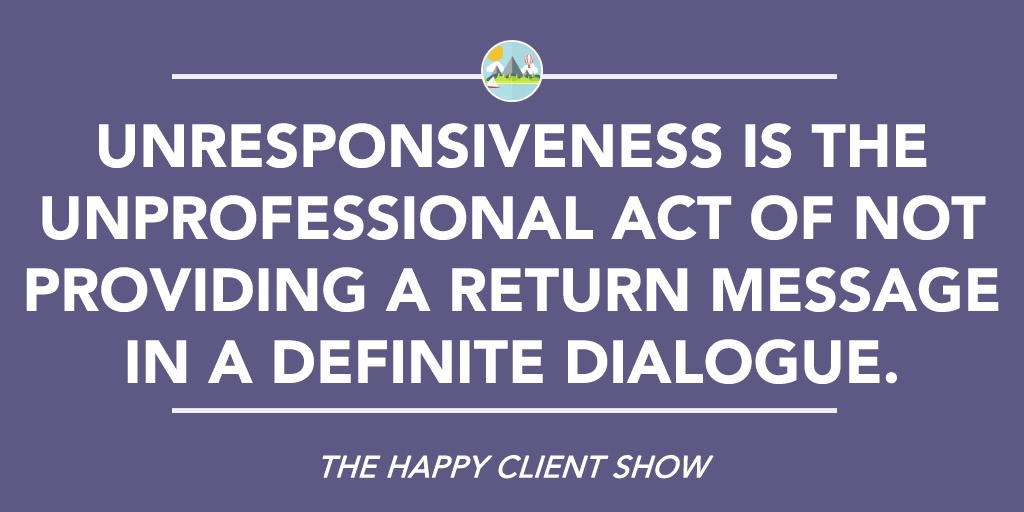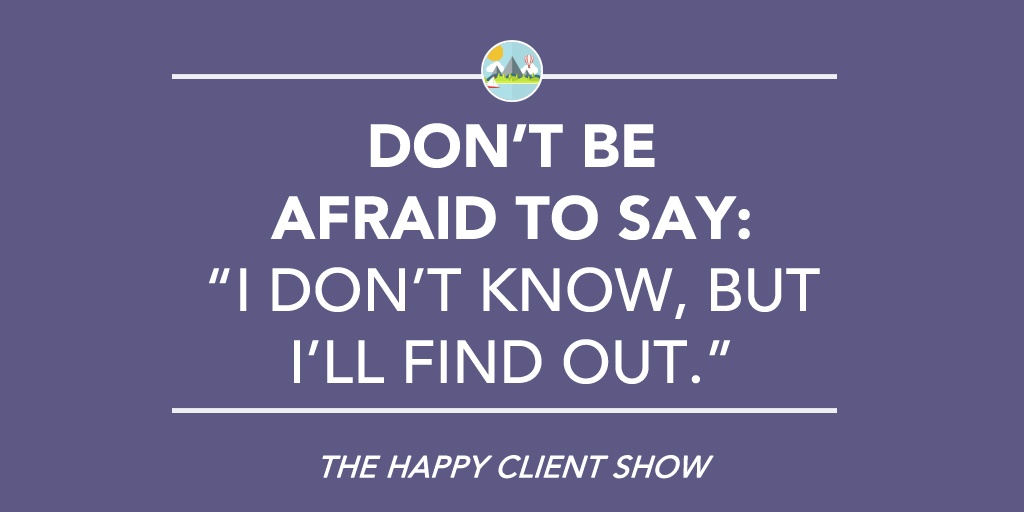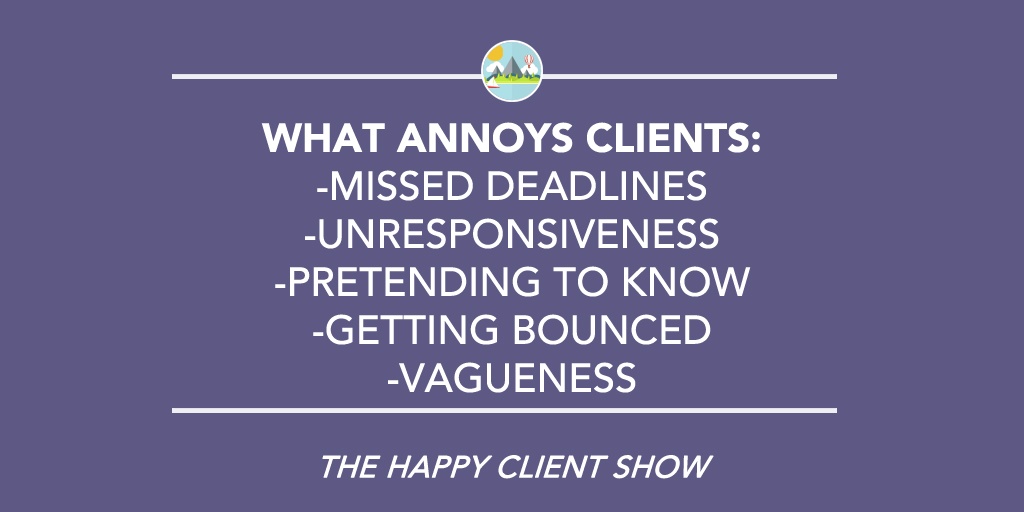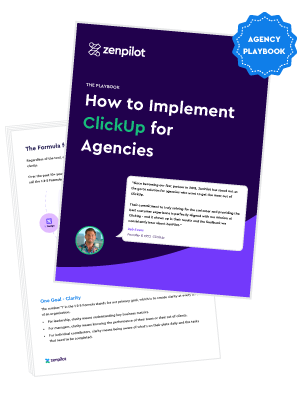5 Things Annoying the Heck out of Your Clients
To chat with Gray and have ZenPilot lead your team through the last project management implementation you'll ever need, schedule a quick call here.
Some agencies like to complain a lot about how their clients annoy them. But sometimes, they are actually the ones that are being annoying.
Are you guilty of the top five things annoying the heck out of your clients?
The #1 Thing Annoying Your Clients (drumroll please): Missed Deadlines
There is a tremendous amount of trust anchored in deadlines.
I’ve been on the corporate side of marketing and communications—both in motorsports and the non-profit world—and one of the biggest things that would frustrate us about our agency partners was when they missed deadlines.
All too often, I think that we as agencies are tempted to make promises we can’t deliver upon. What we have to realize though is that there is a lot more that goes into deadlines that just a projected date of completion. Clients get the deadline date locked into their minds and calendars and base the rest of their marketing activities around what you say.
I remember one time during a website redesign project, we were projecting a completion date three days later than our original deadline. Seemed like just three days to us, but what we didn’t realize is that our client had planned an entire new marketing push around the launch of that website. In order to save the level of trust we built in that relationship, we upped our game and hit that deadline to keep their schedule on track.
Tips to Stay on Deadline
- Under promise—over deliver. If you think it’s going to take six months, project that it will take nine months. This gives you room to account for the unexpected and to look like a hero.
- Look forward. Think through every bit of your process. What is all the information you’re going to need to make the project succcessful? Bring it up as soon as possible and get your client to start gathering that info.
- Think about activities concurrently. Too often, project managers think of activities in a step-by-step manner. You need to change your thinking and ask yourself, “What can both teams do concurrently?”
So, What Happens When Your Client Causes a Missed Deadline?
Trust me. This will happen eventually.
The bottom line is this—you can plan all you want and have the best process in the world, but if the client doesn’t deliver on their obligations then it isn’t your fault. All you can do is do everything in your power to push the project forward.
If there’s nothing left for you to do, and the ball is in their court, then it isn’t your fault. At this point, the only person they can get upset about is at themselves.
- This is why it’s absolutely vital to document everything that occurs in your relationship. This allows you to record assignments, conversations, and obligations.
Unresponsiveness
Let’s define the term “unresponsiveness” real fast. Unresponsiveness is the unprofessional act of not providing a return message in a definite dialogue.

Don’t get me wrong—sometimes there are messages that couldn’t benefit from an extraneous response. That’s not what we’re talking about here though. We’re talking about communications that have a need for response. This could be a client or a request.
By not responding to your clients, and in a timely manner, you’re going to frustrate your clients.
The Rules of Responding
- Verify. Sometimes we don’t always know the answer, but be sure to verify that you’ve seen their message and tell them you’re looking into it. And sometimes, we need to get back in general. Again, verify that you’ve received and tell them you’ll be back to respond.
- Respond within 12 hours. 24 hours at the very most.
- For urgencies, respond within 3-6 hours.
Tips for Being Responsive in a Busy Schedule
- Schedule email blocks. Pick two times in the day that you’re going to blast through your inbox. It can also be helpful to add your email block times in your email signature or at the beginning of the relationship so that they know generally when you respond.
- Appoint someone else to respond. If you know you won’t be availability—whether you’re on a crazy project, vacation or in meetings—appoint another team member to respond and let the client know that will be the case.
- Create a Slack Channel. There are so many benefits to creating a Slack Channel for a client project. It brings transparency to every communication about a project so that the entire team can see what’s going on. It also eliminates 100s (potentially 1000s) of email correspondances and makes communication go faster. Just be sure to set clear expectations on how you’re going to be using the Channel so it doesn’t get out of control.
- Bring your client into your project management tool. This is a great way to keep conversations on point, since they’ll be happening where work is being done.
You Don’t Know What You’re Talking About (and you pretend you do)
A lot of times as agencies we feel obligated to always have an answer. In all honesty, however, we don’t always know the answer.
Clients absolutely loathe when agencies obviously don’t know the answer, but still try to piecemeal an answer together. Trust us, you’re not fooling anybody!
If you don’t know, humbly admit it, but tell them that you’ll find an answer for them. Your clients will respect you for this.

Never just say you don’t know. Always go find the answer and let them know you’re searching for the answer.
Getting Bounce from One Account Manager to the Next
The most important transition that occurs in a client relationship is the transition from the sales team to the project manager team who will actually be handling the work. Don’t be that agency who bounces clients from one account manager to another constantly, especially to account managers who have no idea what the project is even about.
If you don’t have an intentional method for doing this smoothly in your on-boarding process, or you just plain don’t have an on-boarding process, then you need to rethink the way you facilitate your relationships.
Sure, project managers may get fired or leave, but as much as you possibly can, introduce your client to a single point of contact and maintain that consistency.
The Hive Method
In an Agency Journey episode, Square 2 Marketing’s Mike Lieberman talks about how they build “hives” around clients. When the hive starts getting overloaded with work, and it’s time to build a new team, they will peel out one of the managers from that hive and start a new one with a team to support the work.
Your Vagueness
It doesn’t matter what the client says and it doesn’t matter how great the relationship is. They may say they don’t care about vagueness in the relationship, but one day it will hit them like an anvil out of the sky—they’ll wonder what’s going on!
It’s mission critical to be as specific as possible in every part of the relationship. Starting in the sales process, tell them exactly who you are, what you do, and how you do it. Set the stage for how you operate and what they can expect from that process.
Vagueness Could Reveal a Larger Issue
Vagueness might be a symptom that you don’t have a process that you follow as an agency. You’re vague because, honestly, you don’t know what you’re doing. You’re just kind of making it up as you go. Again, you’re not fooling anybody here. Eventually clients will figure it out.
Think through your processes and get them documented. You’ll be able to be specific and better run your relationships.





